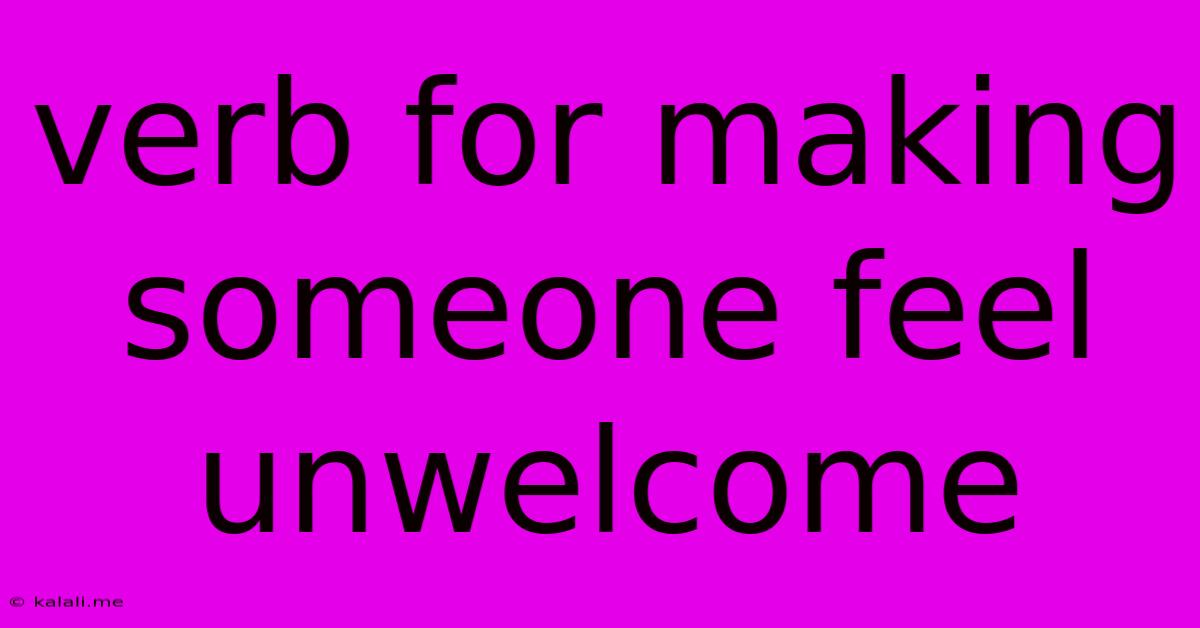Verb For Making Someone Feel Unwelcome
Kalali
Jun 06, 2025 · 3 min read

Table of Contents
Verbs for Making Someone Feel Unwelcome: A Comprehensive Guide
Feeling unwelcome is a deeply unpleasant experience, leaving individuals feeling isolated, anxious, and undervalued. Understanding the nuances of language helps us accurately describe this feeling and the actions that cause it. This article explores various verbs that effectively convey the act of making someone feel unwelcome, categorized for clarity and impact. We'll delve into subtle differences in meaning to help you choose the perfect word for your writing.
Strong Verbs Emphasizing Deliberate Exclusion
These verbs highlight a conscious effort to make someone feel unwelcome, often involving active hostility or deliberate disregard:
-
Alienate: This verb suggests a process of creating distance and estrangement, often through repeated actions. It implies a gradual erosion of the relationship, leaving the person feeling isolated and excluded. Example: His constant criticism alienated his colleagues.
-
** ostracize:** This is a strong verb that emphasizes complete exclusion from a group or community. It suggests a deliberate and often punitive act of shunning. Example: She was ostracized for her unconventional views.
-
Marginalize: This implies pushing someone to the edges of a group or society, making them feel unimportant and insignificant. It often points to systemic issues of power and inequality. Example: The company's policies marginalized women in leadership positions.
-
Exclude: A more straightforward verb, it directly conveys the act of keeping someone out or leaving them out of something. Example: He was deliberately excluded from important meetings.
-
Repel: This verb emphasizes a forceful rejection, often suggesting a strong negative reaction to the person's presence. Example: His aggressive demeanor repelled potential collaborators.
Subtler Verbs Indicating Unintentional or Passive Unwelcomeness
These verbs highlight situations where the feeling of unwelcomeness might be less deliberate, stemming from neglect or passive behavior:
-
Disregard: This suggests ignoring someone's presence or needs, making them feel overlooked and insignificant. Example: Her ideas were constantly disregarded in meetings.
-
Ignore: A simpler verb, it focuses on the act of not paying attention to someone. Example: He was completely ignored by the host at the party.
-
Snub: This implies a deliberate and often public slight, causing the person to feel humiliated and undervalued. Example: She was snubbed by her former friends at the reunion.
-
Neglect: This verb implies a failure to provide attention or care, leading to feelings of abandonment and unworthiness. Example: The new manager neglected to introduce her to the team, leaving her feeling isolated.
Verbs Emphasizing the Creation of an Unwelcoming Atmosphere
These verbs describe actions that contribute to an overall environment where someone feels unwelcome, even without direct targeting:
-
Chill: This suggests creating a cold, unfriendly atmosphere that makes someone feel uncomfortable. Example: The manager's icy demeanor chilled the entire team.
-
Intimidate: This is a powerful verb that emphasizes the use of fear or threat to make someone feel unwelcome. Example: His aggressive body language intimidated the newcomers.
Choosing the right verb depends heavily on the context and the specific nuance you wish to convey. Consider the intensity of the action, the degree of intentionality, and the overall effect on the individual feeling unwelcome. By carefully selecting your words, you can paint a vivid and accurate picture of the situation.
Latest Posts
Latest Posts
-
Can You Bring A Laptop On The Plane
Jun 06, 2025
-
Postgres Create Role If Not Exists
Jun 06, 2025
-
Blue And White Flag American Flag
Jun 06, 2025
-
In The Morning Or On The Morning
Jun 06, 2025
-
What Are Underassigned Points On A Test
Jun 06, 2025
Related Post
Thank you for visiting our website which covers about Verb For Making Someone Feel Unwelcome . We hope the information provided has been useful to you. Feel free to contact us if you have any questions or need further assistance. See you next time and don't miss to bookmark.